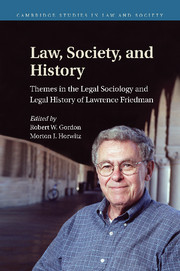Book contents
- Frontmatter
- Contents
- Contributors
- Introduction
- PART I OVERVIEWS AND ASSESSMENTS OF FRIEDMAN'S WORK
- 1 Lawrence Friedman and the Canons of Law and Society
- 2 “Then and Now”
- 3 Lawrence Friedman and the Bane of Functionalism
- 4 Lawrence M. Friedman's Comparative Law
- PART II APPLICATIONS OF CONCEPTS, INSIGHTS, AND METHODS IN FRIEDMAN'S WORK
- PART III THE LEGAL PROFESSION
- PART IV LAW AND LARGE AREAS OF SOCIAL LIFE
- PART V FACTS FROM THE UNDERGROUND: DIGGING LEGAL HISTORY OUT OF THE CELLAR
- PART VI PERSPECTIVES FROM OTHER CONCEPTUAL WORLDS
- Index
- Titles in the series
- References
4 - Lawrence M. Friedman's Comparative Law
Published online by Cambridge University Press: 07 October 2011
- Frontmatter
- Contents
- Contributors
- Introduction
- PART I OVERVIEWS AND ASSESSMENTS OF FRIEDMAN'S WORK
- 1 Lawrence Friedman and the Canons of Law and Society
- 2 “Then and Now”
- 3 Lawrence Friedman and the Bane of Functionalism
- 4 Lawrence M. Friedman's Comparative Law
- PART II APPLICATIONS OF CONCEPTS, INSIGHTS, AND METHODS IN FRIEDMAN'S WORK
- PART III THE LEGAL PROFESSION
- PART IV LAW AND LARGE AREAS OF SOCIAL LIFE
- PART V FACTS FROM THE UNDERGROUND: DIGGING LEGAL HISTORY OUT OF THE CELLAR
- PART VI PERSPECTIVES FROM OTHER CONCEPTUAL WORLDS
- Index
- Titles in the series
- References
Summary
For more than four decades, Lawrence Friedman has been one of the key figures in American law and society studies, as well as the country's leading legal historian. His unique vantage point has brought him into contact with a wide range of subfields in legal studies, including, not least, comparative law. However, Friedman has never published in the leading journals of the comparative law discipline, and he has had only peripheral involvement in the multi-jurisdictional collaborative projects around which comparative lawyers have organized much of their work. Neither does he write about foreign countries. Yet Friedman's series of book chapters and articles commenting on the field of comparative law have articulated a consistent and important methodological challenge to the mainstream of the field.
This chapter elaborates Friedman's comparative jurisprudence and argues that comparative law since the 1960s would have been much more fruitful had it followed Friedman's advice. Friedman's persistent mantra, more often ignored than heeded, has been that comparative law must be integrated with law and society studies. This stance has been rooted in his strong claim that law is not autonomous of other elements of the social system. Only in recent years has the discipline of comparative law begun to come around to Friedman's critique. We have lost more than four decades by ignoring Friedman.
FRIEDMAN ON LAW AND DEVELOPMENT
Friedman and the other grand figures of the law and society movement came of age as scholars in an era, like our own, of optimism about the possibility of transferring legal institutions across borders.
- Type
- Chapter
- Information
- Law, Society, and HistoryThemes in the Legal Sociology and Legal History of Lawrence M. Friedman, pp. 52 - 64Publisher: Cambridge University PressPrint publication year: 2011
References
- 7
- Cited by



